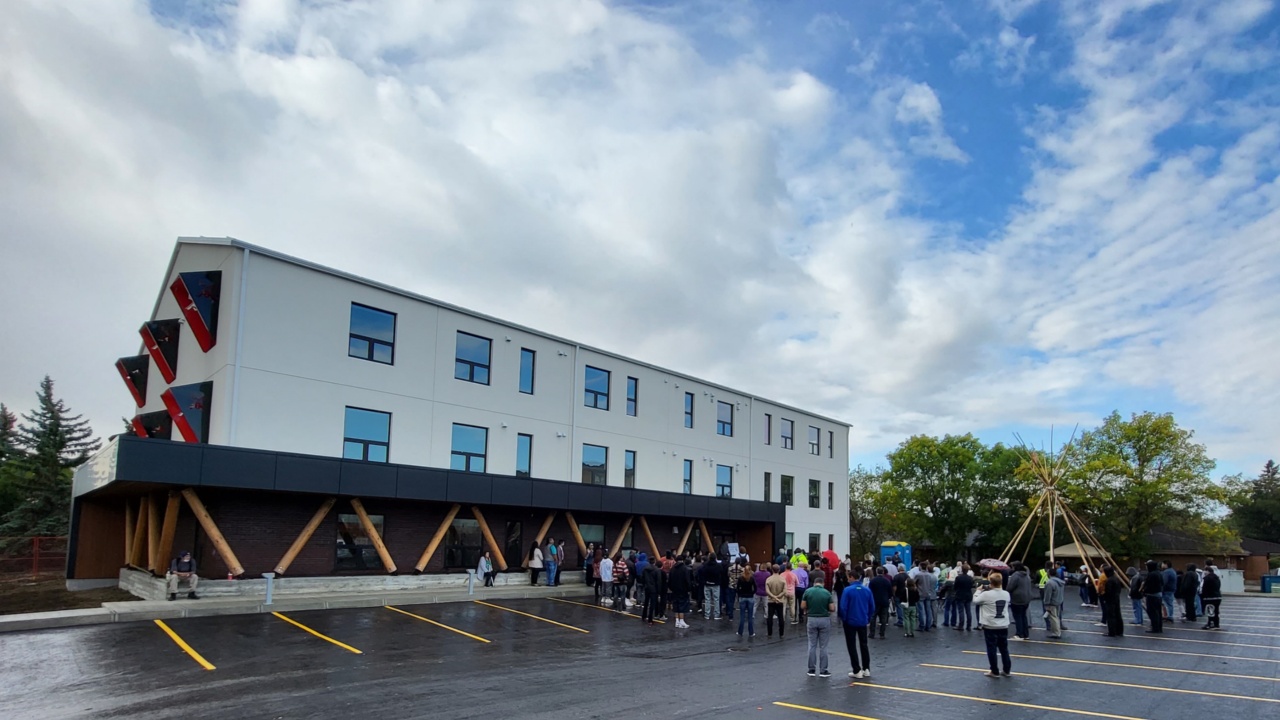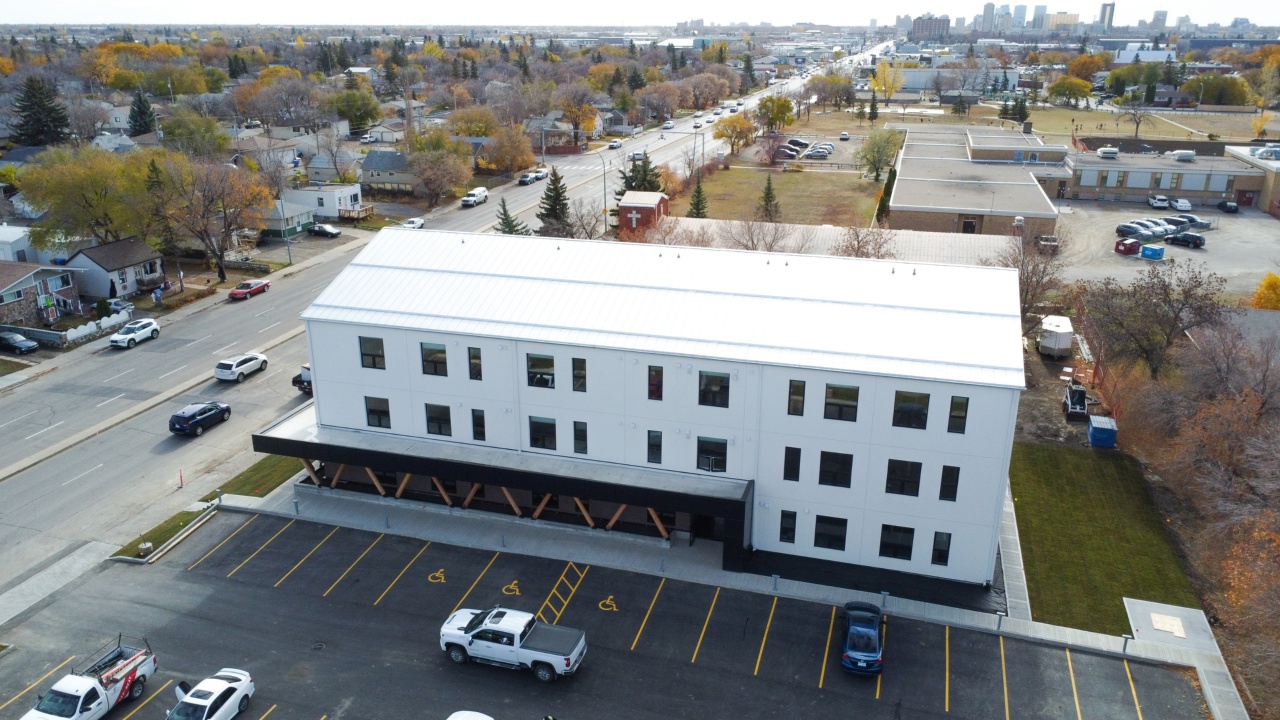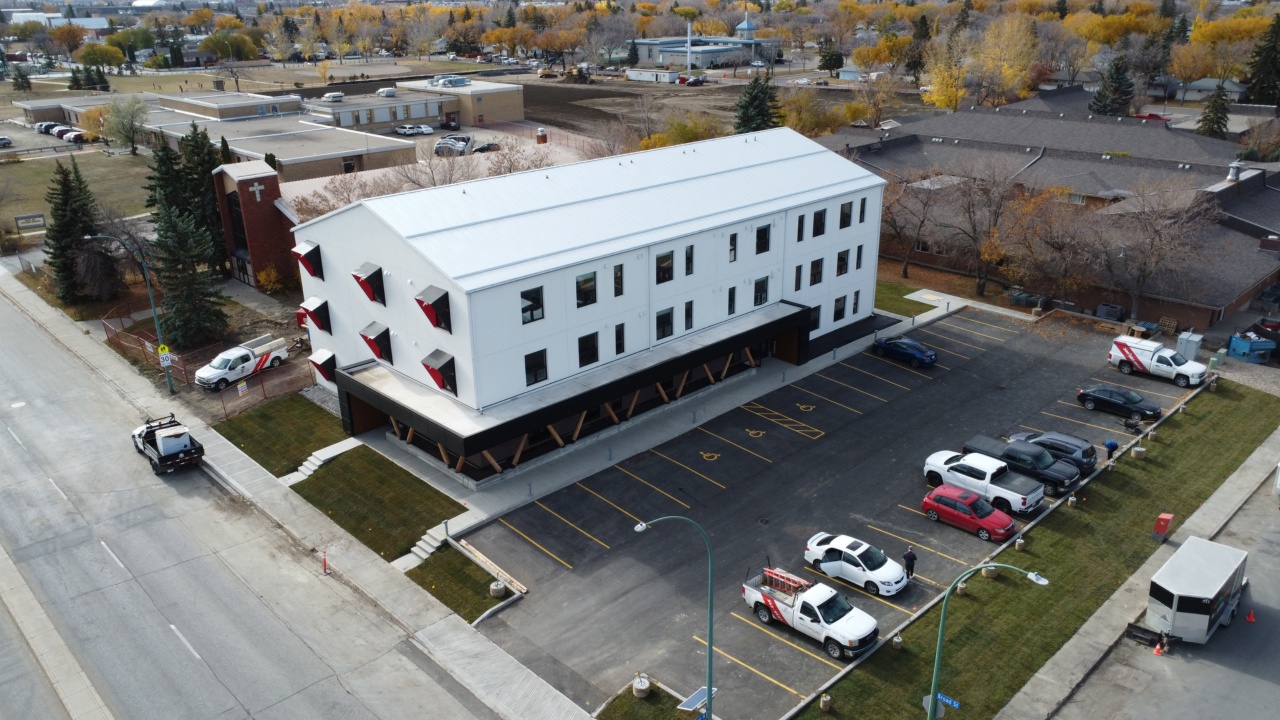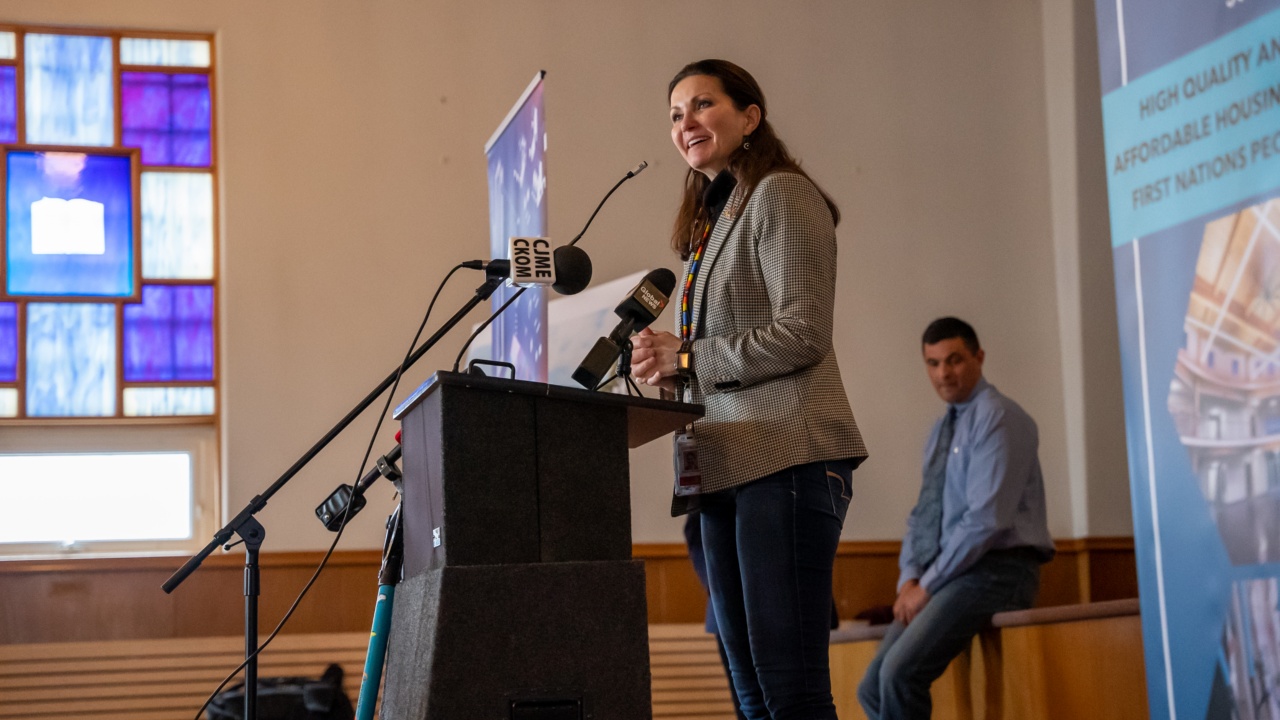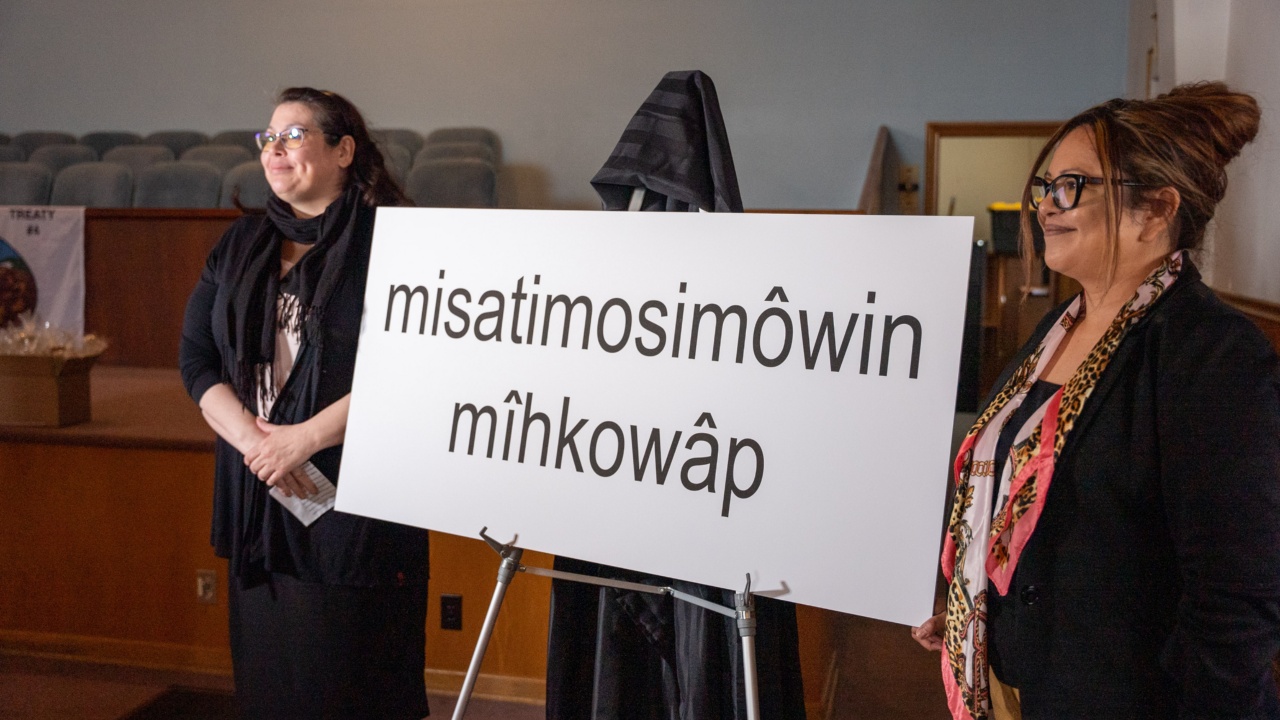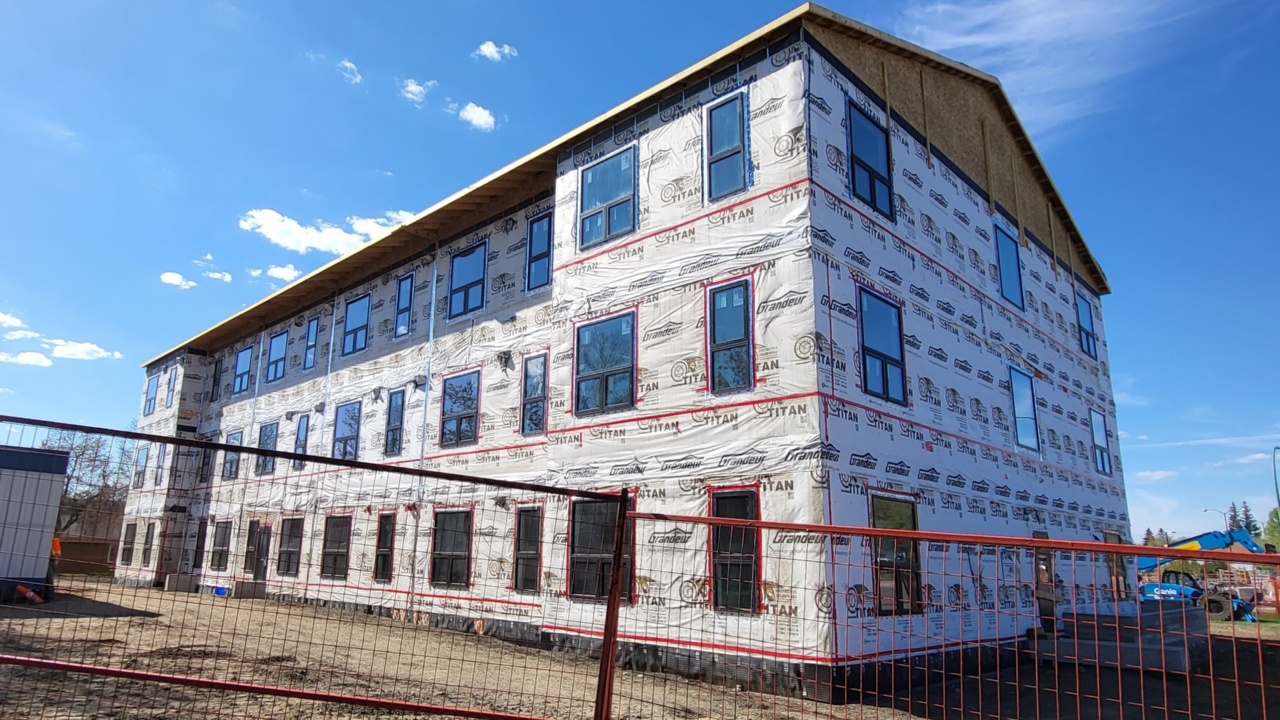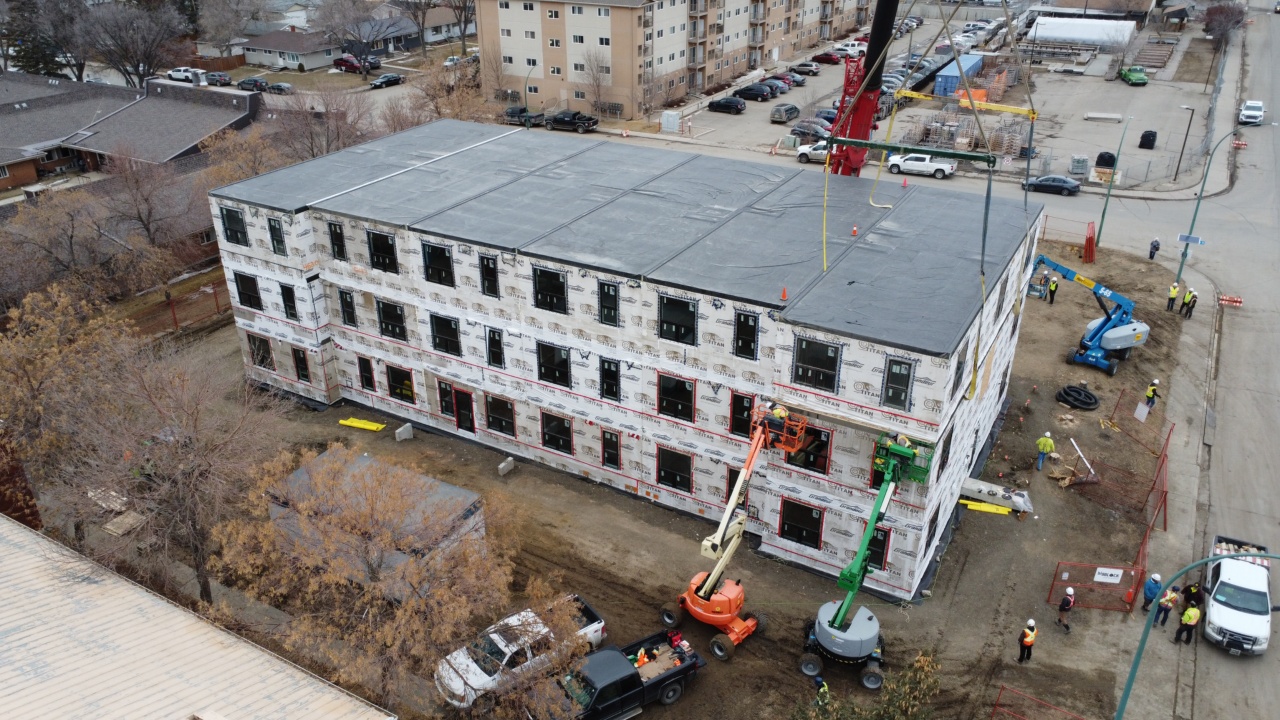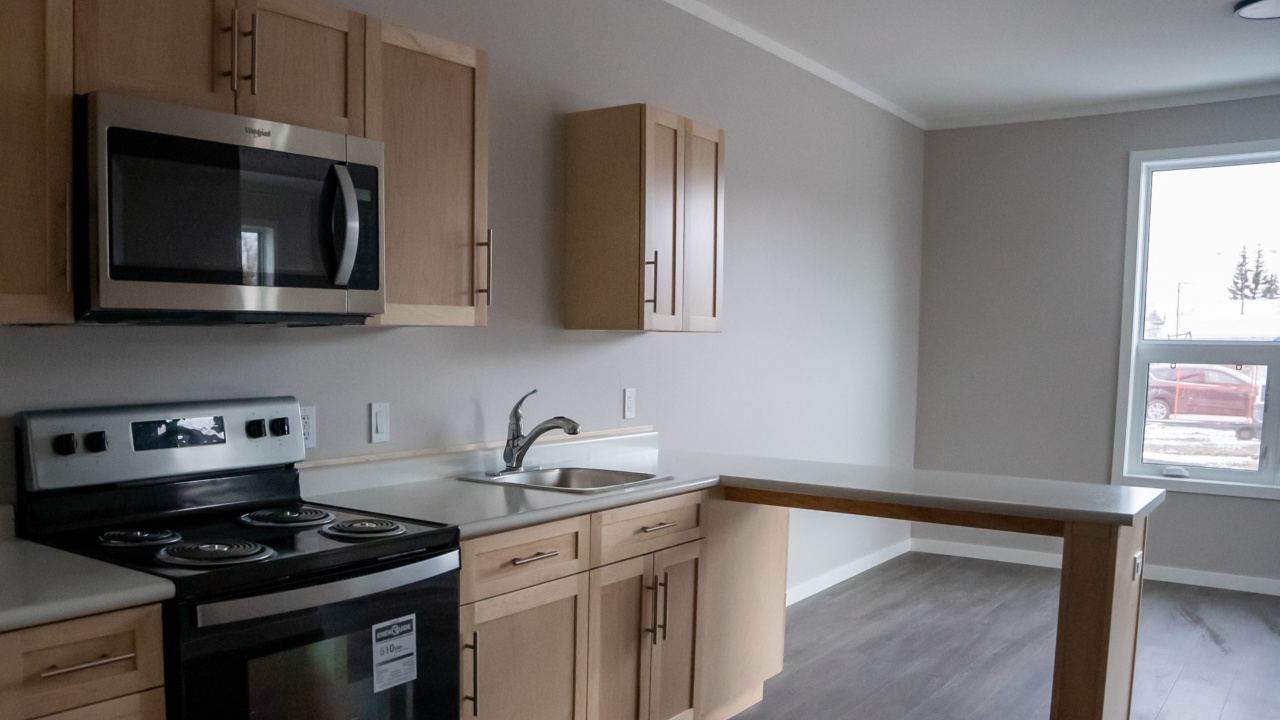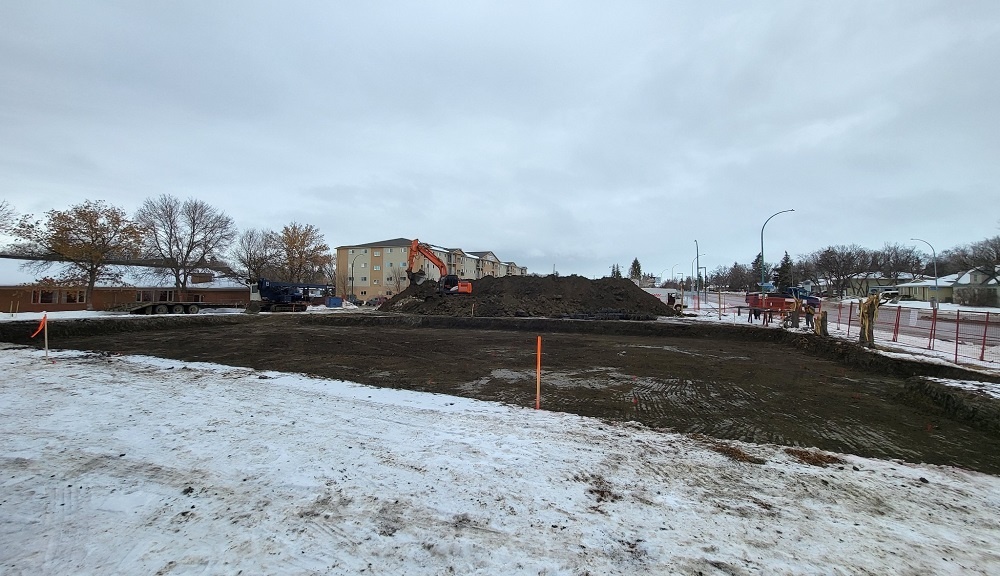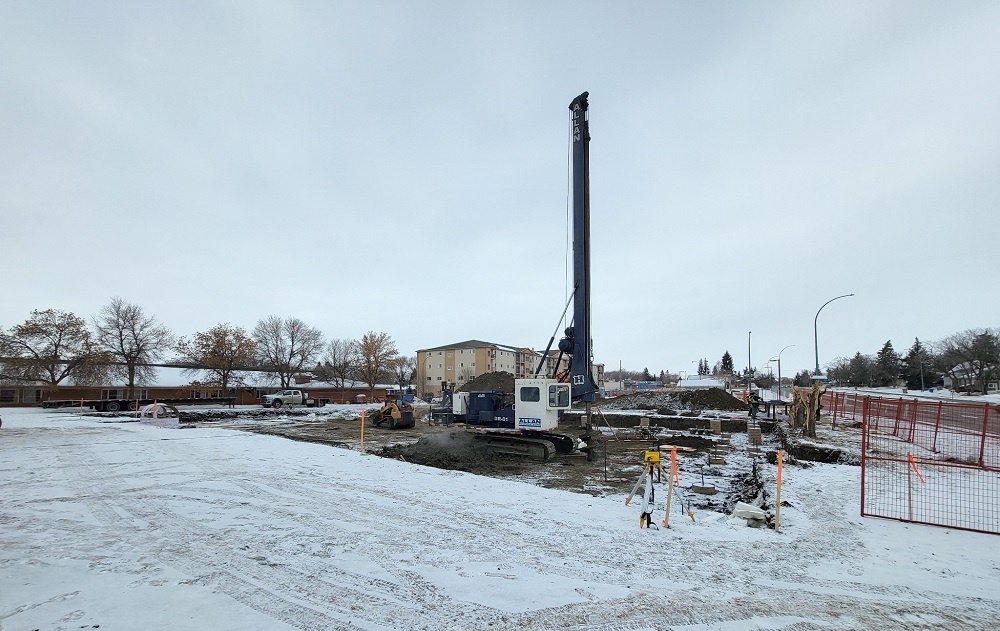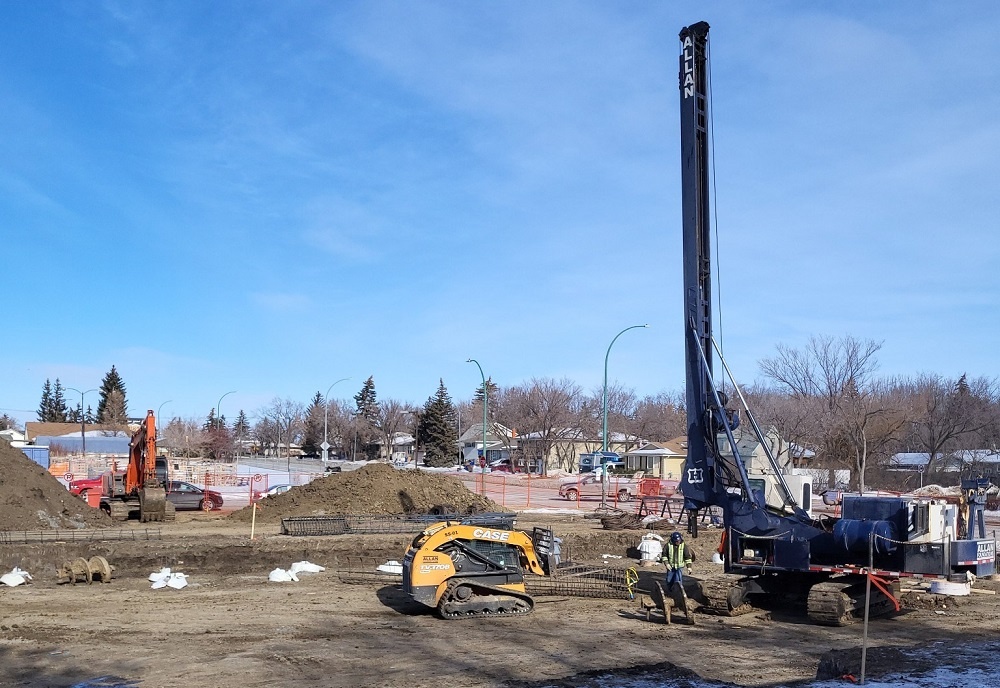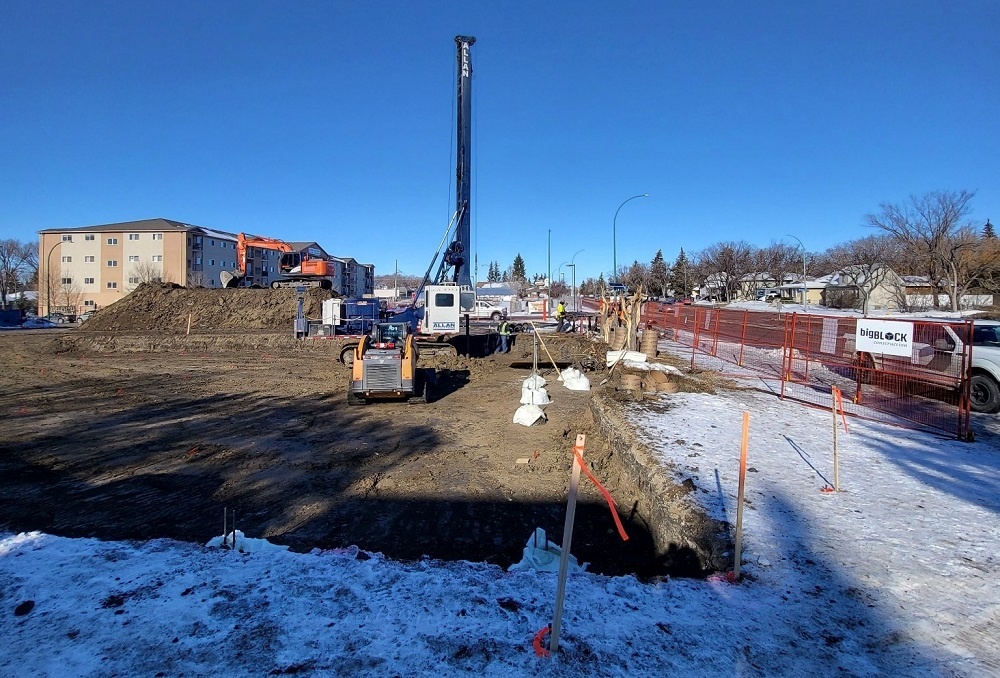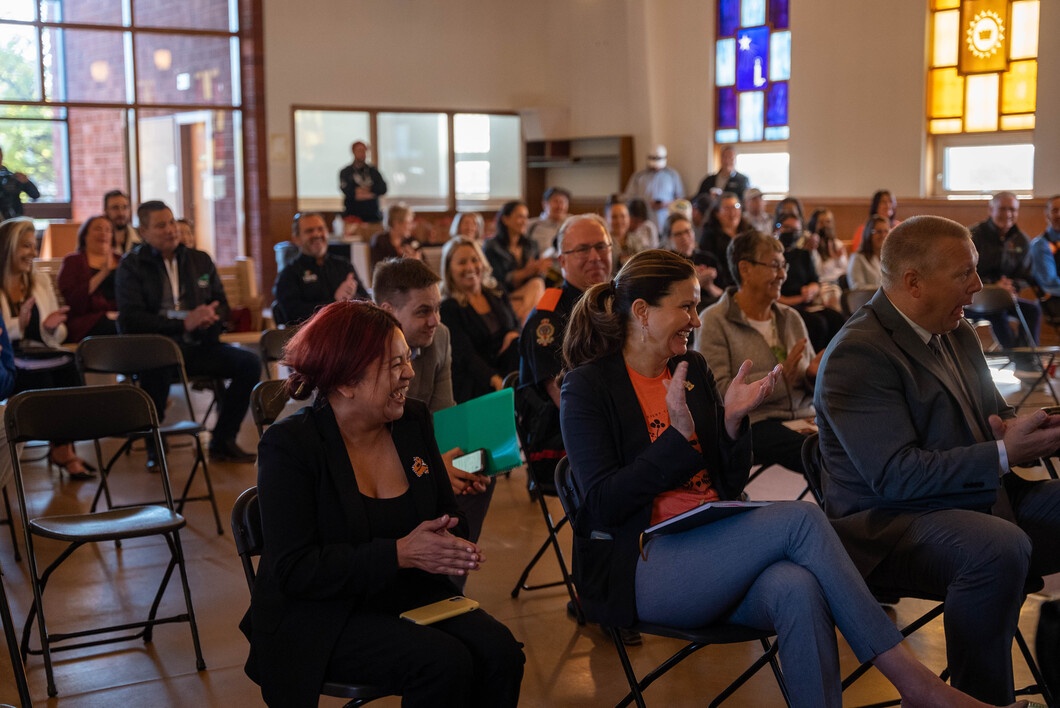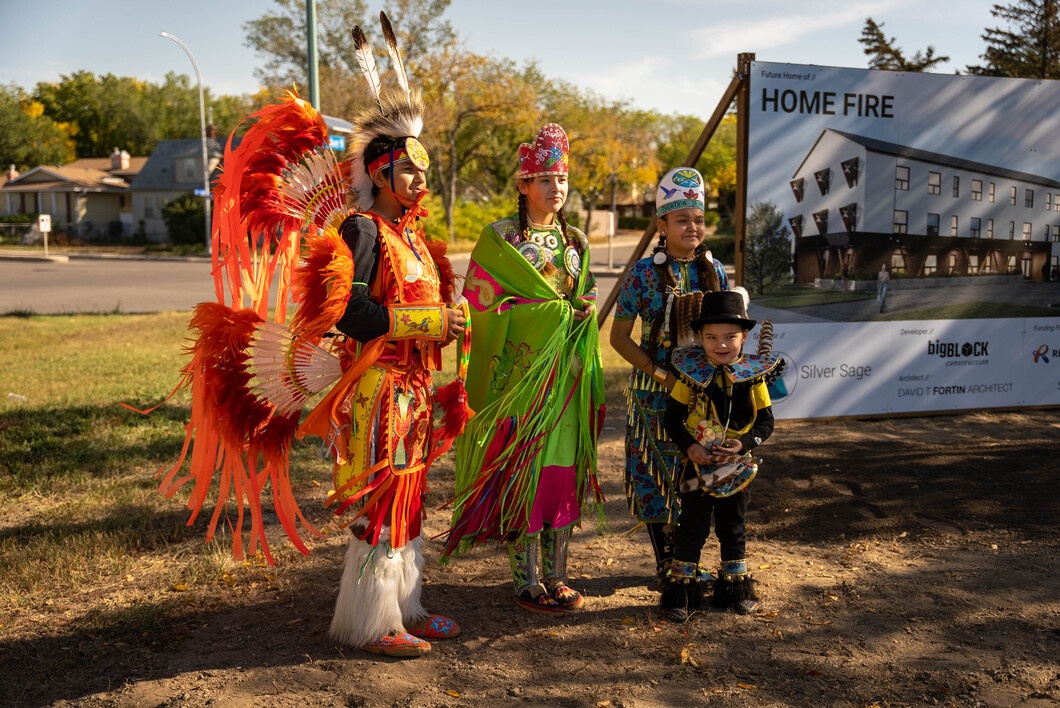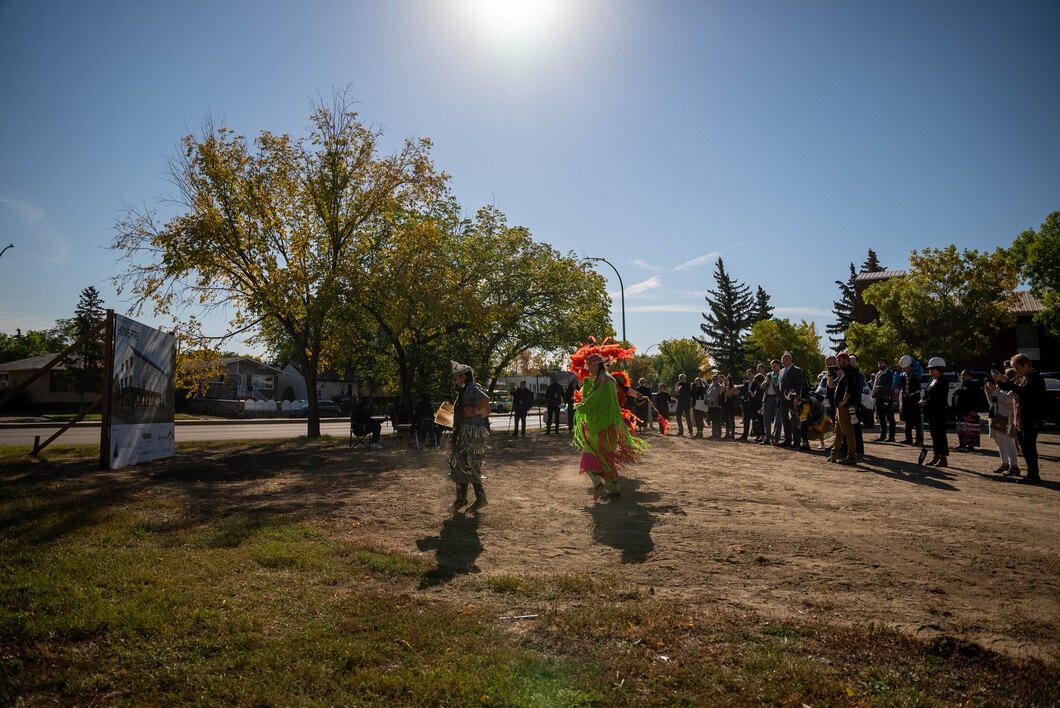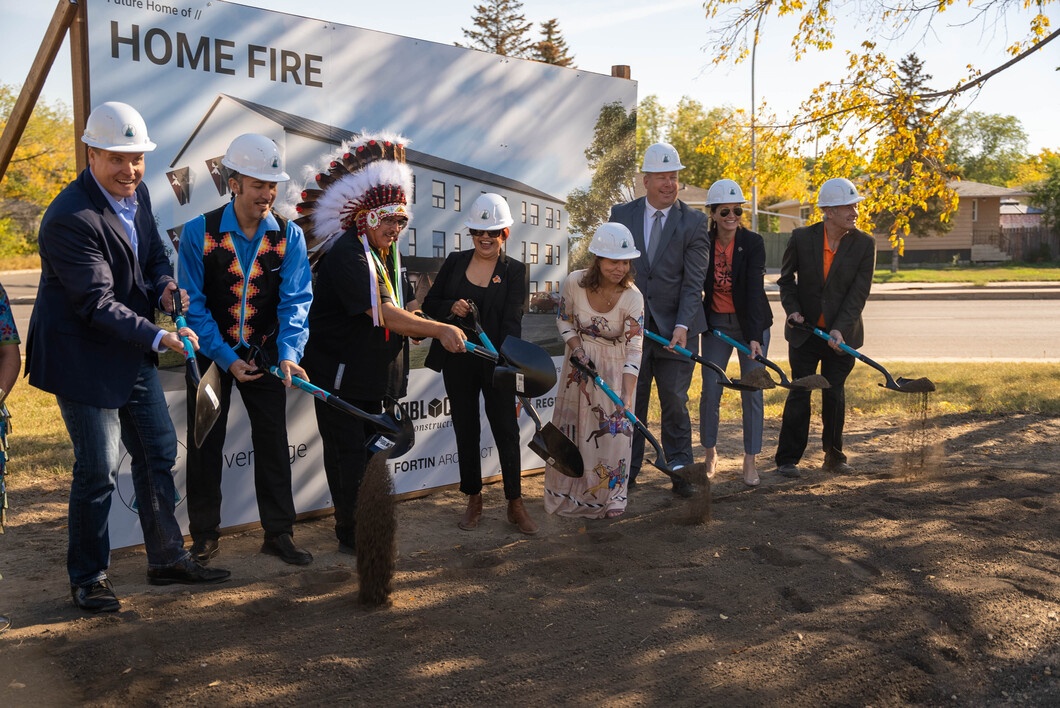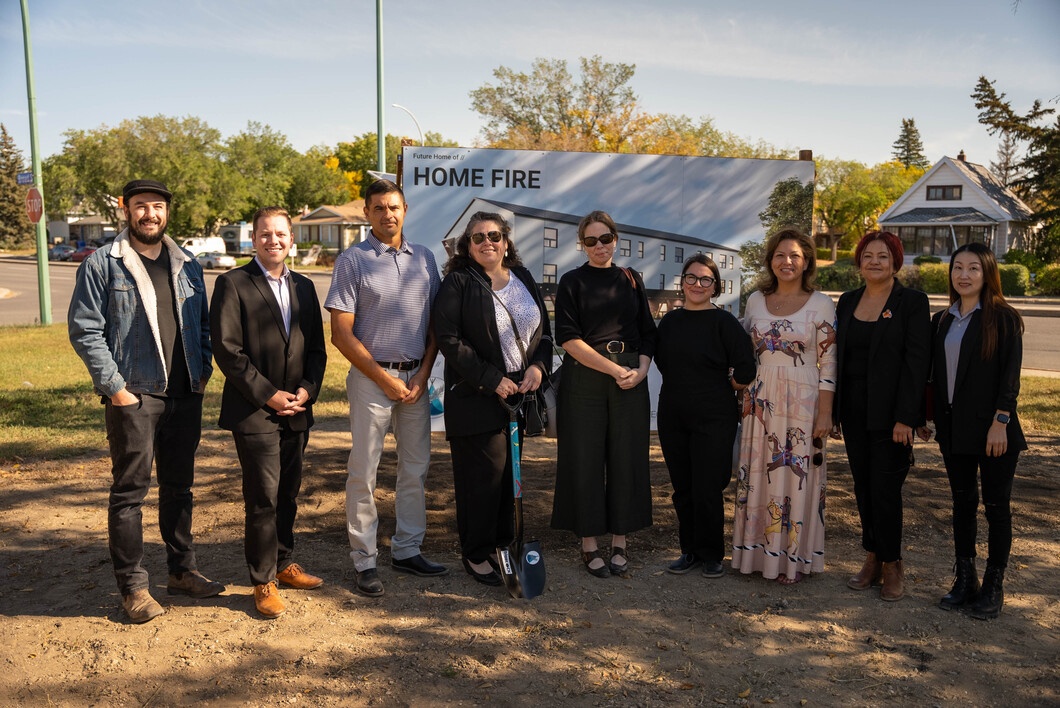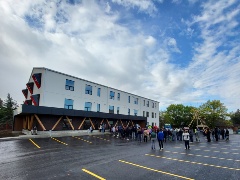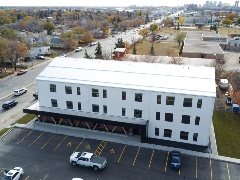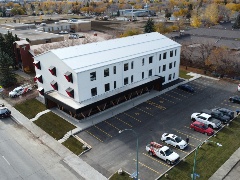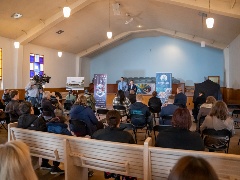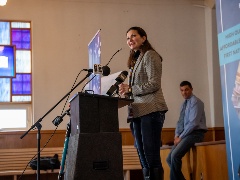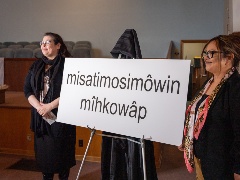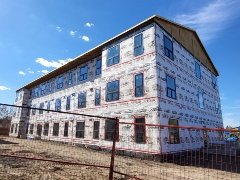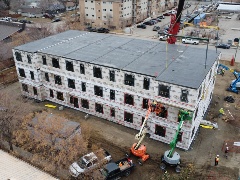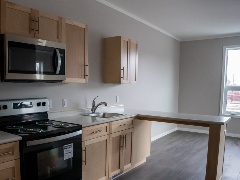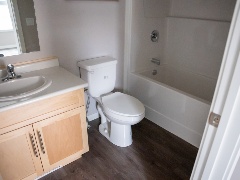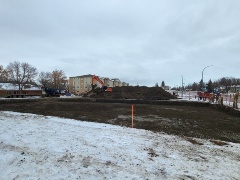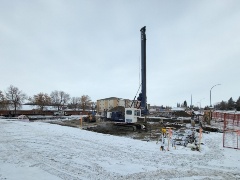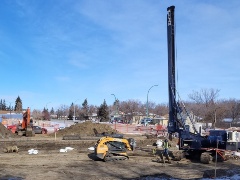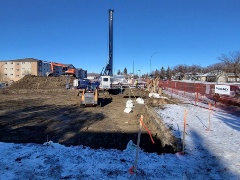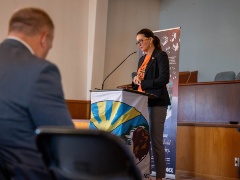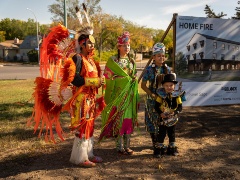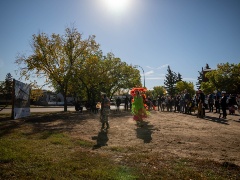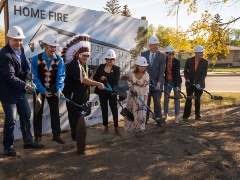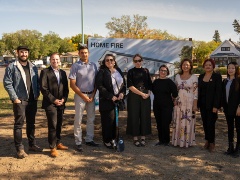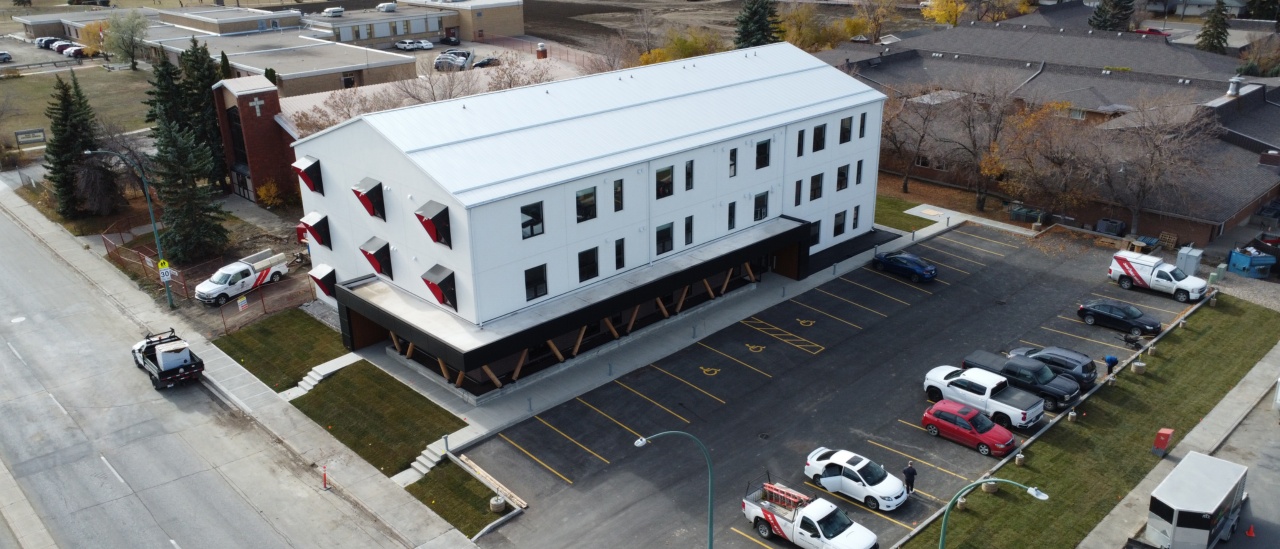The City selected the partnership of Silver Sage Housing and Regina Treaty/Status Indian Services (RTSIS) to lead the project. Silver Sage led the design and construction of the 29-unit multi-family building and RT/SIS is providing programming and supports for residents.
Rendering & Photos
Location
The project is located in Regina’s North East neighbourhood (Ward 7). The site was previously a parking lot and former church building.
Building Name
The building is named Horse Dance Lodge, or misatimosimôwin mîhkowâp in Cree, in reference to the Horse Dance ceremony. From Silver Sage: “The Horse Dance ceremony symbolizes helping and healing our people. In the past we used horses daily. They were always there to help. Their spirit is strong and kind and we honor them for all that they do for us.”
Building Design
SSH and RTSIS worked in collaboration with Big Block Construction and architect David T. Fortin on the design elements of the building. The design team also hosted a Sharing Circle to hear from individuals who will eventually live in these homes, and they worked with local artist Linda Obey-Lavallee to provide input on patterns and symbols that reflect the many local Indigenous cultures.
With additional funding through the City’s Housing Incentives Program, the project has been upgraded to “Net Zero Ready”, exceeding the code-mandated level of energy efficiency by 40 per cent. Energy efficiency improvements to the project will allow future residents of the building to benefit from reduced utility bills and supports targets set out in the City’s Energy & Sustainability Framework.
Community Events and Outreach
Community Information Session - January 5, 2022
Community Meet and Greet – June 16, 2022
Sod Turning – September 28, 2022
Craning Ceremony – April 14, 2023
Grand Opening – September 14, 2023
If you have questions, please reach out to Silver Sage at RHI@silversage.ca or the City at rapidhousing@regina.ca
Timeline
Funding > Plan > Design > Build > Operate
- July 2021: CMHC announces allocation of RHI funding to City of Regina; City commences search for a site
- August 2021: City submits proposal to CMHC; City invites non-profit organizations and housing providers to submit proposals for the City’s Permanent Supportive Housing operating Grant
- September 2021: City selects RTSIS/SSH to operate the building through the Permanent Supportive Housing Operating Grant
- October 2021: City makes conditional offer on purchase of 120 Broad Street
- November 2021: CMHC approves the City’s RHI proposal
- December 2021: Site selection finalized
- January 2022 (ongoing): Community education and outreach
- February 2022: City Council approves land transfer and provision of capital funds to SSH
- Spring-Summer 2022: Planning and design; Construction timelines adjusted
- September 2022: Sod turning ceremony
- October 2022: Site work begins
- April 2023: Module craning onsite
- September 2023: Site work complete
- October 2023: Building opening celebration and occupancy
Frequently Asked Questions
Find commonly asked questions and answers about the Rapid Housing Initiative.
What is the Rapid Housing Initiative?
In 2021, the City received $7.75 million under round two of the federal government’s Rapid Housing Initiative (RHI) Cities Stream to deliver a minimum of 29 new affordable housing units within 12 months. Once constructed, the units must be maintained as affordable for a minimum of 20 years. While the City is able to work with a non-profit intermediary, the City remains signatory to all agreements with CMHC for the 20-year term.
When will the project be completed?
While originally slated for completion in December 2022, construction was delayed due to manufacturing and supply chain issues. The building is now anticipated to be ready for occupancy in mid-2023. The delay will not impact the funding and CMHC is committed to working with the City to address challenges and support the delivery of the project.
What is the City’s Role?
The City is best positioned to maintain its current role of supporting the creation of affordable housing units in partnership with local non-profit organizations. Regina is home to many experienced non-profit organizations that have well-established relationships with the communities they serve and who understand local housing needs.
The City’s role in this project includes:
- Facilitating the provision of investment to our selected non-profit organization
- Supporting them to build and operate the housing
- Ensuring the project complies with development requirements (land use, zoning, building code) similar to all development projects within the City
- Information sharing with the public
- On-going monitoring and reporting to CMHC over the 20-year agreement timeline
What type of housing will this project be?
This RHI project is considered transitional or supportive housing. This is longer-term housing that is distinct and different from emergency shelters, drop-ins and other forms of temporary accommodations. The building itself will hold 29 apartments as well as office and communal space to provide support services to residents.
Purpose built supportive housing provides safety, stability, and dignity to residents and allows them to improve their lives and integrate within the community. This may include reuniting with children or other family members, attending school or other training and obtaining employment. Supportive housing is an important part of the housing continuum and a critical component to ending hoseelessness and building healthy, safe and inclusive neighbourhoods.
What is the need for supportive housing in Regina?
Regina’s most recent Point-In-Time Count (September 2021) found 488 people experiencing houselessness. Although not all of these individuals would be assessed to need supportive housing, the number of individuals in our City experiencing houselessness is growing and the number of people waiting for supportive housing placements remains high.
This RHI project will help to address the need for additional longer-term supportive housing, which houses residents who have chosen to exit houseelessness and are taking steps towards healing and community integration.
Who is going to operate the building?
The partnership of Silver Sage Holdings Ltd. (SSH) and Regina Treaty/Status Indian Services (RTSIS) was selected through a grant application process. These Indigenous organizations represent a solid partnership with a proven track record of providing safe, secure, affordable housing and support services. They have experience supporting individuals who are transitioning to permanent housing.
SSH is the largest off-reserve housing provider in Saskatchewan and has been working to advance social housing outcomes in Regina for Indigenous clients since 1983.
Since 1994, RTSIS has been working as the exclusive Indigenous-owned and governed, human services delivery agency providing a wide range of program and service interventions to multi-barrier clients in and around Regina. RTSIS works with a network of service delivery partnerships to ensure clients have access to a continuum of social services that can help support them in making successful transitions to independence, wellness and community belonging.
Who will live in this housing development?
SSH and RTSIS intend to manage an inclusive space that is open to men, women and children, including 2SLGBTQ+ residents. SSH and RTSIS provide “status-blind” services and are committed to serving people in need, regardless of race, ethnicity or any other factor.
A condition of the Rapid Housing Initiative (RHI) funding is that a minimum of 25% of units be targeted towards women or women and their children. This is a consistent expectation for all RHI projects across Canada. The funding also targets a minimum of 15% of units be targeted towards Indigenous residents. This RHI project is likely to exceed this target as Indigenous people are over-represented among those who require access to supportive housing in Regina.
What support services will the residents receive?
Support services will be tailored to the individual needs of each resident. Some services will be provided on-site, and others will be managed in partnership with other community service organizations and agencies like the Saskatchewan Health Authority.
Supports provided to residents may include:
- Healthy Living – meal preparation, nutrition, personal care
- Social Inclusion – counselling, life skill training, access to programs and services
- Cultural – access to healing spaces, traditional medicines, traditional learning opportunities with Elders and Knowledge keepers
How much did the site cost?
The City purchased the property for $1,200,000 which was funded through the federal government’s RHI allocation to the City of Regina. The appraised value of the property is $1,553,000.
Who is funding the development?
The Federal Government allocated $7.75 million in capital funding through the RHI to the City of Regina. The program and funding is administered by the Canadian Mortgage and Housing Corporation (CMHC).
The Government of Saskatchewan is providing an additional $783,000 10-year forgivable loan towards the capital development of the RHI project.
The City is contributing $615,000 in capital funding through the Housing Incentive Program (HIP) and is providing operating funding of $1 million annually to provide support services to the residents at the building through the Permanent Supportive Housing Operating Grant.

